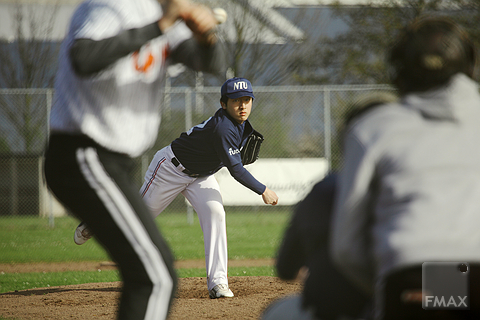TU Delft’s Hitmanics baseball team is one of the most internationally sports clubs on campus, as Michael Hsieh, a new player from Taiwan, recently discovered.
From the US and Canada to Japan, Taiwan and South Korea, the first cues of spring mark the start of the baseball season. And so it is here in Delft as well, as the university’s HitManics student baseball club opened their season last weekend with a game against a team from Maasluis. The HitManics were founded three years ago by Richard den Breejen, a coach and player on the team. Today the HitManics club has a four-member board, two coaches and team members from all over the world.
Students from Cuba, US, Japan and Australia played on the team in previous seasons. The 2011 team has 22 players on its roster, including Dutch, Dutch-American, Dutch-Antilles, South Korean, German, and Taiwanese students.
“We’re quite an international team, with 40% international students,” says Emma van Bruggen, who plays first base and is only female player on the team so far this season.
Every Tuesday evening, from early March to mid-October, the team practices on the soccer field behind the Sport’s Centre, doing their routine hitting, fielding and pitching drills. Besides the regular practices, the team also regularly hosts social activities like BBQs, to help the team-bonding off the field.
Michael Hsieh, a pitcher from Taiwan who has played baseball since high school, enjoys the interesting cultural differences he’s discovered on the Dutch baseball field. “There’s lots of differences,” he says “ like back in Taiwan it’s common during practice to signal to your teammates by yelling or shouting at them, but the first time I did that here on the field everyone was looking at me like I was nuts!”
“Well, we Dutch people usually just do this,” adds The HitManics coach, Den Breejen, laughing as subtly and quietly tips his cap.
“It’s also different how food and drink mingles with baseball,” Hsieh continues. “Back in Taiwan after practice we always eat a lot – once our team ordered 400 dumplings after a game. But here in Holland I usually go beer drinking with my teammates right after practice – with an empty stomach!”
Despite the enthusiasm of its players, though, the reality is that team struggles to maintain enough players. “It’s quite hard to have a regular number of players on the team because the season is short. And when students graduate we desperately need a new generation of players, so we warmly welcome both Dutch and international students to join us!” Den Breejen says.
“On the field there are simply no borders. It’s a fun sport, we love it, that’s why we’re all here,” adds secondbaseman Sander Lustenhouwer. “Baseball is our common language.”
Hitmanics practice every Tuesday, from 17:30-20:00, at the Sports Centre’s soccer field #2. Everyone is invited to join, including beginners. Email Hitmanics at delfthitmanics@ gmail.com or via the Hitmanics Facebook page. The team’s first game in Delft is on April 24 against BlueBirds, a rival team from Delft.
Synthetic Biology is a relatively new field, where biology and engineering combine to achieve new biological functions and systems not found in nature. Previous TU Delft teams have won several medals. The pressure is high to uphold that reputation.
The goal of the iGEM competition is to create a catalogue of biological systems, like the ability to live in salt water, in order to provide a standardized characterization of these systems. Then, researchers around the world can use the catalogue to look up the needed function in a bacteria.
The 2010 team is focusing on oil degradation by altering E.coli bacteria to process oil in a salty environment. E.coli is a fast-growing and well-researched bacteria; some kinds of it are already capable of processing oil. Parts of an algae are capable of living in salty environments. Through recombining the DNA of this bacteria and the algae, the team of researchers aims to create bacteria that can clean water contaminated by oil.
Chemicals are usually used to deal with oil spills, but they in turn pollute the water. Using synthetic biology, the team is looking for a better alternative.
The student researchers working on this project also face ethical issues. Critics of synthetic biology say it is dangerous, since unexpected outcomes might occur. However, the students claim their research is safe. The lab equipment used for this project cannot facilitate the creation of dangerous bacteria.
Next year there will be another iGEM team. So, if you are interested in synthetic biology and looking for a new challenge in competing with the top students around the world, you should think about joining the IGEM team next year.



Comments are closed.